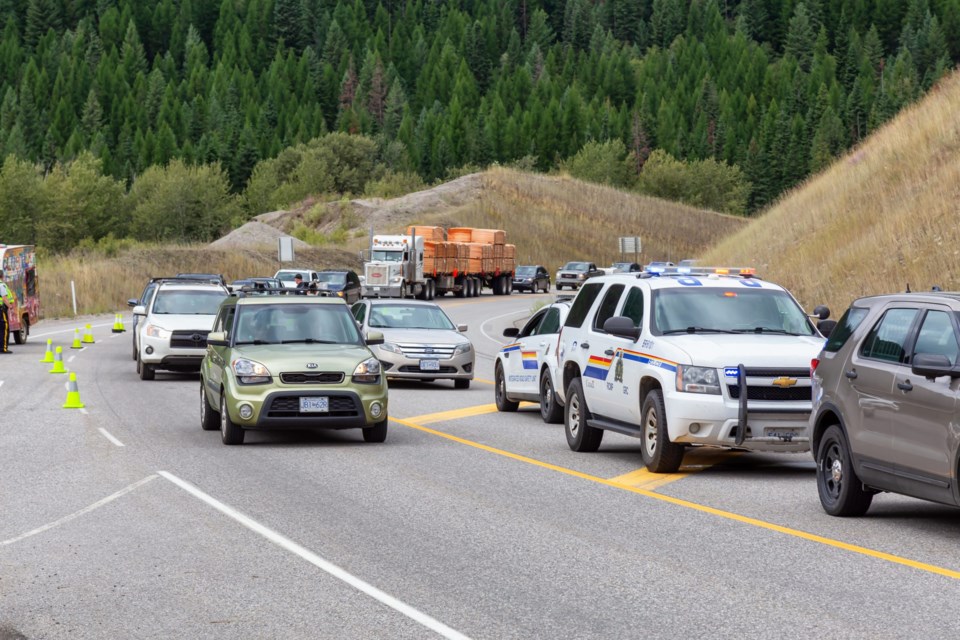B.C. finally unveiled its new ban on non-essential travel Friday, and it’s a far less ambitious plan than Premier John Horgan first promised.
What began as an April 19 pitch from Horgan for “random” police roadblocks to curb the spread of COVID-19 between health authorities, emerged 11 days later as a watered-down public relations exercise.
Solicitor General Mike Farnworth announced Friday an educational campaign with police to remind motorists they shouldn’t be travelling during the current circuit-breaker restrictions, which last until May 25.
“I want to be clear that the intent of this order is not punishment, but rather education around non-essential travel prevention to protect us all from the spread of COVID-19,” he said.
The final product is a small handful of police checkpoints built around the honour system. No one will be required to provide documentation proving they are travelling for essential reasons - such as a health care appointment, child custody, work, fleeing abuse, or visiting a relative in a long-term care home. Simply rattle off one of the 21-designated essential exemptions, true or not, and you are waived through.
In fact, police will be limited in what questions they can ask motorists, such as your name and license, perhaps a piece of secondary ID, and a brief description of the purpose of your travel (again, honour system.)
Passengers won’t be checked at all.
Fail to meet this exceedingly low bar, and police will first try to turn you around.
Clearly, the government had to compromise to get the RCMP, its union and stakeholders from the BIPOC (black, Indigenous, and people of colour) community to even agree to give the checkpoint plan a shot.
Some of those compromises include the fact officers won’t be allowed to exercise arbitrary discretion to conduct street-style checks of suspicious vehicles, and people’s information won’t be recorded in police databases.
That consultation was clearly lacking when Horgan blurted out the idea April 19. Since then, it’s been an exercise in walking what the premier said backwards until it fit into something the province could actually deploy in the real world.
Fines are still on the table, in theory - up to $575 for breaking the travel ban - but it’s clear nobody really wants to issue them if they can help it.
Not only will the roadblocks be educational, but Farnworth said their locations will be announced in advance so that everyone knows where and when the police will be checking. Then, several kilometres before any checkpoint, there will be signs posted and the opportunity for people to turn around before they encounter police, said Farnworth.
You’d have to be monumentally stupid to end up with a ticket under this system.
Then again, the world has its fair share of stupid people. And if you roll up to a Coquihalla Highway checkpoint in a motorhome with two kayaks strapped to the top and a bike trailer wobbling behind, you deserve a ticket, honour system or not.
There won’t be any checkpoints in the Lower Mainland, where most of the COVID-19 cases are actually centred, because of logistical challenges enforcing health authority borders between communities. Also, unstated, is the potential voter blowback in vote-rich urban ridings that constitute the NDP’s power base.
“Our intention is to discourage recreational and leisure travel, not punish people, and we are not interested in disrupting commuters and people going about their lives,” said Farnworth.
Taken in its totality, there’s nothing offensively wrong with the government’s police checkpoint idea. It will be a series of gentle reminders to most motorists to turn around. Perhaps, despite all odds, it may even result in some actual tickets.
Had this all been released the day the premier first spoke, it might even have looked like a bold idea to try something new.
But instead, it was a two-week exercise in confusion. The government had no answers for questions peppered by an anxious electorate, worried they might be cut off from family or work by military-style roadblocks.
In the end, the final checkpoint program likely strikes the right balance between warnings and enforcement. It’s just not as harsh as the premier first proposed. And in this case, that’s a good thing.
Rob Shaw has spent more than 13 years covering BC politics, now reporting for CHEK News and writing for The Orca. He is the co-author of the national best-selling book A Matter of Confidence, and a regular guest on CBC Radio.
SWIM ON:
- ‘Abandoning the basics of communication’ – Rob Shaw on vaccination pop-up clinics.
- Daniel Marshall tells the extraordinary story of how a Fraser gold seeker became the foremost economic thinker of his time.
- Chilliwack surprised many in 2020. The surprise of election night, Ada Slivinski says her adopted hometown isn’t what many think.



